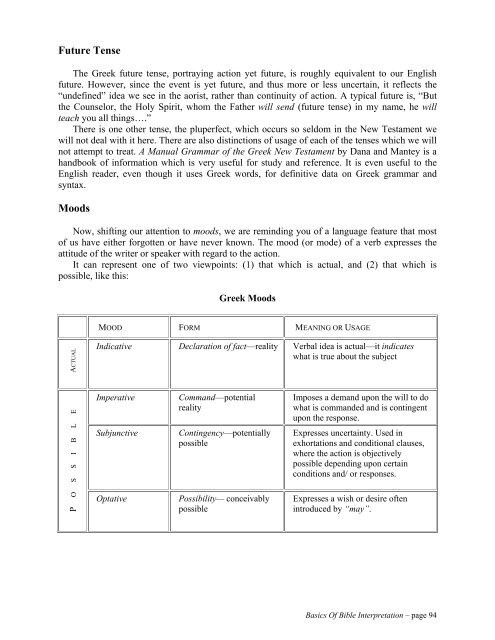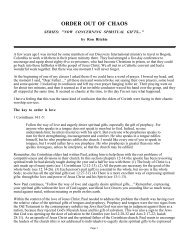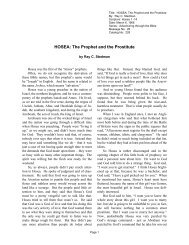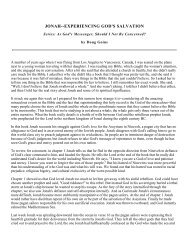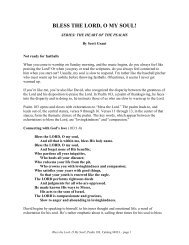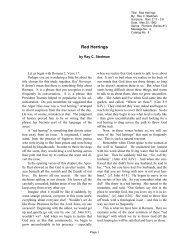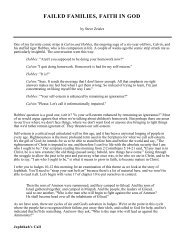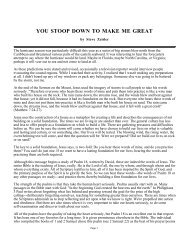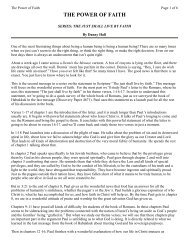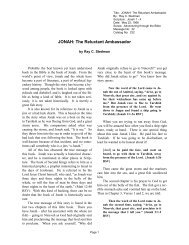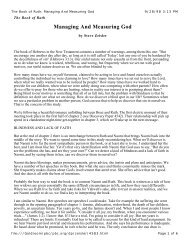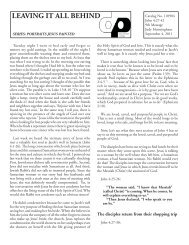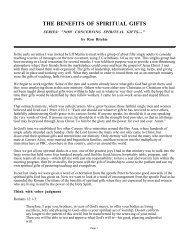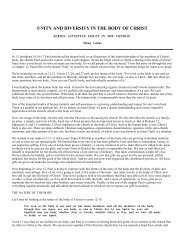Basics of Bible Interpretation - RayStedman.org
Basics of Bible Interpretation - RayStedman.org
Basics of Bible Interpretation - RayStedman.org
You also want an ePaper? Increase the reach of your titles
YUMPU automatically turns print PDFs into web optimized ePapers that Google loves.
Future Tense<br />
The Greek future tense, portraying action yet future, is roughly equivalent to our English<br />
future. However, since the event is yet future, and thus more or less uncertain, it reflects the<br />
“undefined” idea we see in the aorist, rather than continuity <strong>of</strong> action. A typical future is, “But<br />
the Counselor, the Holy Spirit, whom the Father will send (future tense) in my name, he will<br />
teach you all things….”<br />
There is one other tense, the pluperfect, which occurs so seldom in the New Testament we<br />
will not deal with it here. There are also distinctions <strong>of</strong> usage <strong>of</strong> each <strong>of</strong> the tenses which we will<br />
not attempt to treat. A Manual Grammar <strong>of</strong> the Greek New Testament by Dana and Mantey is a<br />
handbook <strong>of</strong> information which is very useful for study and reference. It is even useful to the<br />
English reader, even though it uses Greek words, for definitive data on Greek grammar and<br />
syntax.<br />
Moods<br />
Now, shifting our attention to moods, we are reminding you <strong>of</strong> a language feature that most<br />
<strong>of</strong> us have either f<strong>org</strong>otten or have never known. The mood (or mode) <strong>of</strong> a verb expresses the<br />
attitude <strong>of</strong> the writer or speaker with regard to the action.<br />
It can represent one <strong>of</strong> two viewpoints: (1) that which is actual, and (2) that which is<br />
possible, like this:<br />
Greek Moods<br />
MOOD FORM MEANING OR USAGE<br />
ACTUAL<br />
Indicative Declaration <strong>of</strong> fact—reality Verbal idea is actual—it indicates<br />
what is true about the subject<br />
P O S S I B L E<br />
Imperative<br />
Subjunctive<br />
Optative<br />
Command—potential<br />
reality<br />
Contingency—potentially<br />
possible<br />
Possibility— conceivably<br />
possible<br />
Imposes a demand upon the will to do<br />
what is commanded and is contingent<br />
upon the response.<br />
Expresses uncertainty. Used in<br />
exhortations and conditional clauses,<br />
where the action is objectively<br />
possible depending upon certain<br />
conditions and/ or responses.<br />
Expresses a wish or desire <strong>of</strong>ten<br />
introduced by “may”.<br />
<strong>Basics</strong> Of <strong>Bible</strong> <strong>Interpretation</strong> – page 94


